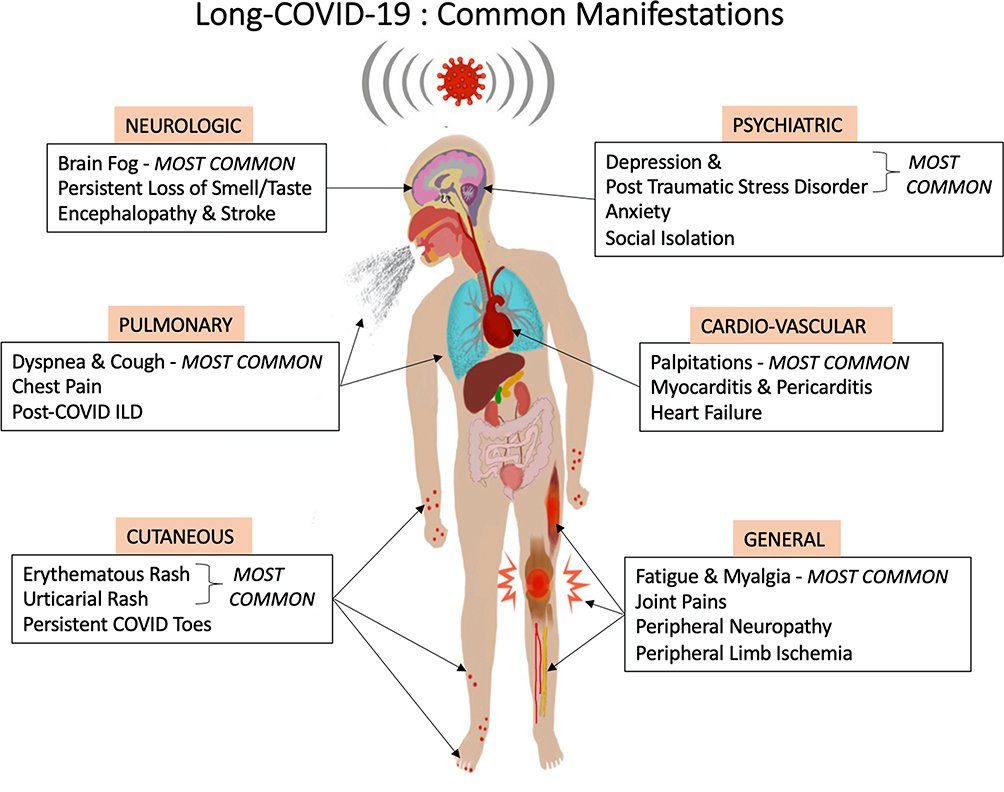While The World Is Losing The Battle Against One Pandemic-COVID-19, WHO Is Extremely Concerned About The Emerging Parallel Pandemic-Long COVID
Source: Long COVID Aug 05, 2021 4 years, 4 months, 2 weeks, 5 days, 17 hours, 25 minutes ago
Despite the advent of COVID-19 vaccines, the world is beginning to come to terms that the COVID-19 crisis is not going away any time soon and that it is a losing the battle as more transmissible and potent SARS-CoV-2 variants keep on emerging. Already it is anticipated that from now till next year, more concerning variants are likely to emerge with the anticipated ‘Omega’ variant that will change the course of the whole COVID-19 pandemic likely to make its debut by the mid of next year.

As more than 200 million people known to have had COVID-19 officially (Realistic figures could be as high as tenfold!) the WHO on Wednesday it was deeply concerned by the unknown numbers who may still be suffering with
Long COVID.
The WHO or World Health Organization urged people struggling with the after-effects of the virus despite having recovered from the acute phase to seek medical help.
To date, Long COVID remains one of the most mysterious aspects of the pandemic and is projected to be a health pandemic by itself.
Already numerous emerging studies are showing that not only the SARS-CoV-2 virus itself is causing immune disruptions and affecting the various organs but the viral proteins as well as what some researchers are claiming to be prion like structures originating from the virus itself is also causing disruptions in more than 84 identified human cellular pathways so far and also causing genetic changes.
The most common medical conditions being witnessed to date from long COVID are fatigue, muscular pains, strokes, heart failures, acute kidney injury, a wide range of neurodegenerative diseases, liver and gastrointestinal issues, immune disorders, susceptibility to secondary opportunistic infections, fertility disorders besides just lung damage.
It is expected that a variety of cancers will arise soon among those infected.
Ms Maria Van Kerkhove, the UN health agency's COVID-19 technical lead, told a press conference on Wednesday, "This post-COVID syndrome, or Long COVID, is something that WHO is deeply concerned about. The WHO was making sure that we have recognition of this, because this is real".
Ms Van Kerkhove said of those infected with SARS-CoV-2 ie the virus which causes COVID-19 disease-"many are suffering from long term effects".
She added, "We don't know for how long these effects last and we're even working on a case definition to better understand and describe what this post-COVID syndrome is.”
Ms Van Kerkhove said the WHO was working to have better rehabilitation programmes for Long COVID sufferers plus broader research to gain a better understanding of what the syndrome is and how it can be managed.
The World Health Organization has held a series of seminars this year aimed at expanding understanding of post-COVID conditions, hearing not only from scientists and doctors but also directly from sufferers themselves.
To date, little is known about why some people, after coming through the acute phase, struggle to recover and suffer ongoing symptoms includi
ng shortness of breath, extreme fatigue and brain fog as well as cardiac and neurological disorders.
Dr Janet Diaz, the clinical care lead in the WHO's emergencies programme who leads the organisation's Long COVID efforts, said there had been more than 200 reported symptoms.
https://www.thailandmedical.news/news/the-second-pandemic-concurrently-long-covid-ucl-study-shockingly-identifies-more-than-200-long-covid-symptoms-across-10-organ-systems
Among them are chest pain, tingling and rashes, she told a WHO live social media session on Tuesday.
Dr Diaz said some patients had symptoms that dragged on from the acute phase; others got better and then relapsed, with conditions that could come and go; while others had symptoms that only appeared after recovering from the acute phase.
Clinical evidence and studies can only go back as far as the first patients to recover from COVID-19, which first emerged in China in December 2019.
Dr Diaz said some individuals seemed to have post-COVID conditions for three months, and others up to six months.
Dr Diaz added, "We are concerned there may be a small proportion that go on to nine months - and to longer than that."
The American expert said it was not yet fully understood what caused the post-viral symptoms, with various hypotheses including neurological problems, the immune response to the infection, and the virus persisting in some organs.
Ms Van Kerkhove added, "We advise anyone who is suffering from the long-term effects to seek help."
Meanwhile many health experts are also advocating that many who have been deemed as having ‘recovered’ from COVID-19 , whether they were asymptomatic or had mild or moderate symptoms, to keep on monitoring their general health and especially their hearts and to have frequent checkups as it is now becoming apparent that the incidence of strokes and heart failures among these groups are very high and that in many countries, there has been a high percentage of excess deaths due to strokes and heart failures.
https://www.thailandmedical.news/news/breaking-swedish-study-shows-that-covid-19-is-now-a-key-driver-for-heart-attacks-and-strokes
Long COVID is also expected to put a heavy strain on public healthcare globally for the next few decades.
For more on the
long COVID-19 pandemic, keep on logging to Thailand Medical News.
